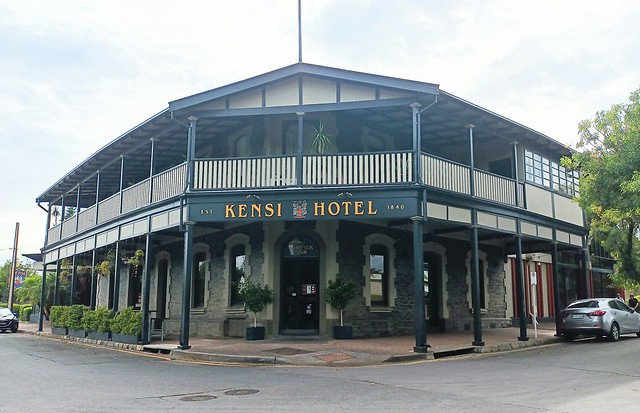And because I travel on the road a lot, I get to see a lot of pubs. I sometimes stop for a drink or a meal, and sometimes I stay overnight. What enthrals me about old Aussie pubs is the stories that have been told around these bars and the histories attached to these buildings.
I'd love you to join me and share any yarns you have about old Aussie pubs and hotels. Were you a publican? Did you grow up in a hotel with parents who were? Did you buy an old hotel and restore it as a new home. Please share.
Below is a continually updated slideshow of hotels I have visited. Some I've just driven past or found on a lonely country road - others I've spent some time in. Click on any image to read more or add comments.
- Roderick Eime, Burnside SA
Read more with these great books.
 |
| Great Australian Pubs by Lee Mylne Great book if you can find one. |
The reluctant immigrants - convicts, marines and a handful of gentry - who made up the First Fleet brought to the shores of Botany Bay little more than optimism and a monstrous thirst for the appalling brew known as 'grog'. Almost two centuries later the optimism has been largely justified but, if the ubiquitous pub is any indication, the national thirst has not yet been slaked.
Nothing now remains of the earliest grog shops-leaking canvas tents and wretched wattle-and-daub shanties-but their offspring can be found in most corners of the sunburnt country: on the Birdsville Track and in the great cities, in prosperous country towns and on the edge of the Never-never, among the canefields and the fishing villages and the dusty mining towns.
And just as the Australian developed a distinctive national character, so the Australian pub assumed a style all its own. But not just a single style, for there is almost as much variety in the shape, size and character of our pubs as there is in their faithful customers.
It is these differences that Douglass Baglin and Yvonne Austin have captured in these pages. Every pub has its history, has played a role in the life of its neighbourhood (be that an inner-city suburb or a thousand square miles of spinifex and bindi-eyes), and has provided companionship, solace and refreshment for travellers and regulars alike.
Modernisation and real estate speculation have sounded the death knell for many pubs (several illustrated here have long since fallen to the wrecker's ball). Others have fought back and survived: former 'blood-houses' have redecorated their once-dingey bars; country hostelries have been restored; and even some of the modern bars in high-rise hotels have been given something more than a stainless-steel-and-plastic treatment.
Our pubs deserve looking after. They've been abused and criticised, but undeniably they're here to stay. Increasingly, their contribution to Australia's heritage is being appreciated. Their architectural styles (many of them unique to our country) are being recognised as precious relics from our past. Their stories and legends are being brought out of the closet and dusted up for public viewing. Most importantly, in the face of tough competition from clubs and restaurants, they are continuing to thrive as convivial and attractive places in which to relax in good company.
 |
| Text source: Douglass Baglin and Yvonne Austin 'Australian Pub Crawl' | Murray Child 1977 |
 |
| Australian Bush Pubs 3rd Ed A Celebration of Outback Australia's Iconic Watering Holes |





1 comment:
Good one.
Post a Comment